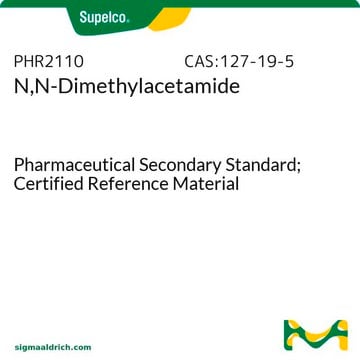261483
N,N-Dimethylacetamide dimethyl acetal
90%
Synonym(s):
1,1-Dimethoxy-N,N-dimethylethylamine
About This Item
Recommended Products
assay
90%
form
liquid
refractive index
n20/D 1.411 (lit.)
bp
118 °C (lit.)
density
0.911 g/mL at 25 °C (lit.)
SMILES string
COC(C)(OC)N(C)C
InChI
1S/C6H15NO2/c1-6(8-4,9-5)7(2)3/h1-5H3
InChI key
FBZVZUSVGKOWHG-UHFFFAOYSA-N
Looking for similar products? Visit Product Comparison Guide
Related Categories
General description
Application
- one carbon inserting synthon in preparation of pyrimido[1,2-a][1,3,5]triazin-6-ones
- reagent for the synthesis of amides, diacylamines and heterocycles
signalword
Danger
Hazard Classifications
Acute Tox. 3 Dermal - Acute Tox. 3 Inhalation - Acute Tox. 4 Oral - Eye Irrit. 2 - Flam. Liq. 2 - Skin Irrit. 2 - STOT SE 2 - STOT SE 3
target_organs
Eyes,Central nervous system, Respiratory system
Storage Class
3 - Flammable liquids
wgk_germany
WGK 3
flash_point_f
46.4 °F - closed cup
flash_point_c
8 °C - closed cup
ppe
Eyeshields, Faceshields, Gloves, type ABEK (EN14387) respirator filter
Certificates of Analysis (COA)
Search for Certificates of Analysis (COA) by entering the products Lot/Batch Number. Lot and Batch Numbers can be found on a product’s label following the words ‘Lot’ or ‘Batch’.
Already Own This Product?
Find documentation for the products that you have recently purchased in the Document Library.
Customers Also Viewed
Our team of scientists has experience in all areas of research including Life Science, Material Science, Chemical Synthesis, Chromatography, Analytical and many others.
Contact Technical Service
















